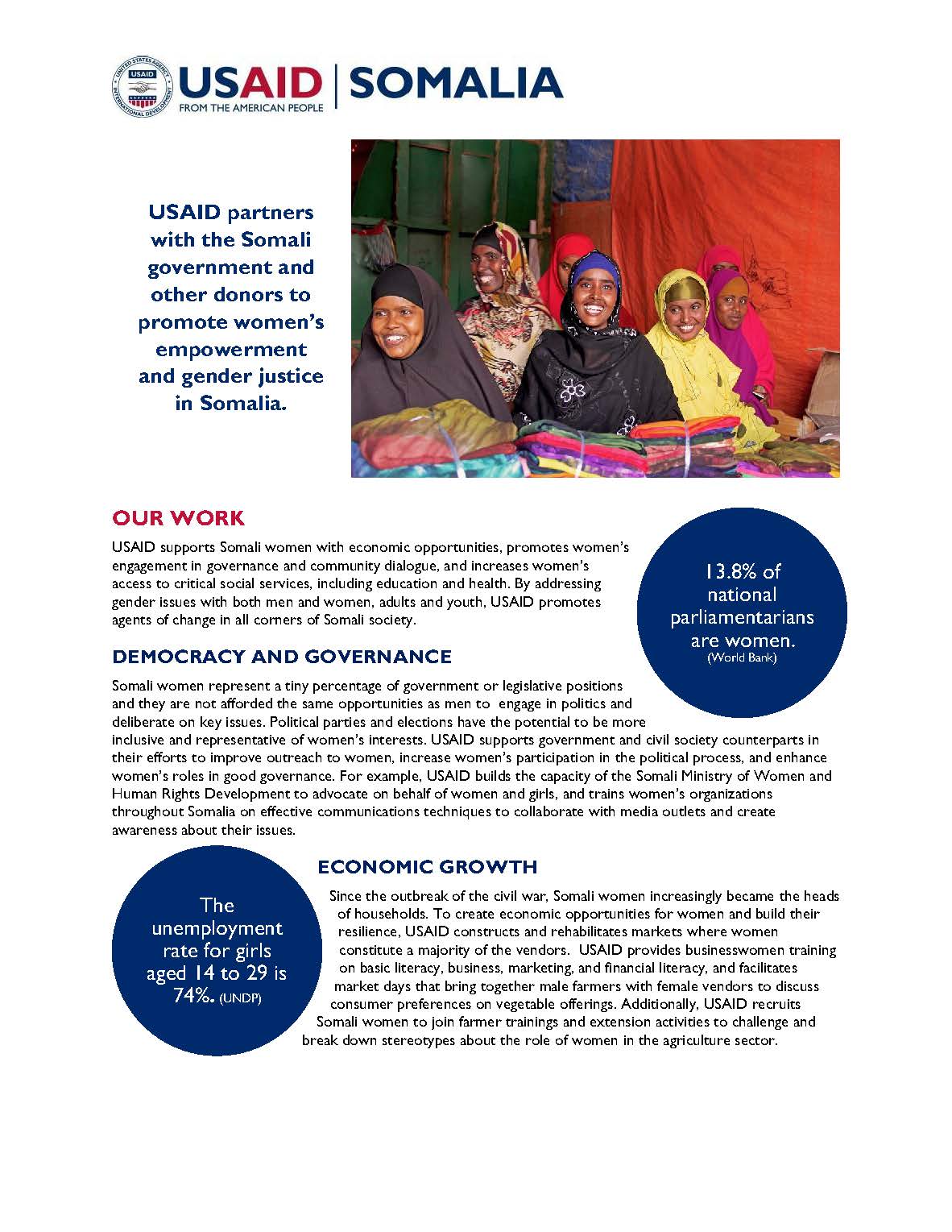Home » Somalia Cross-cutting Fact Sheet - Gender
USAID partners with the Somali government and other donors to promote women’s empowerment and gender justice in Somalia.
OUR WORK
USAID supports Somali women with economic opportunities, promotes women’s engagement in governance and community dialogue, and increases women’s access to critical social services, including education and health. By addressing gender issues with both men and women, adults and youth, USAID promotes agents of change in all corners of Somali society.
DEMOCRACY AND GOVERNANCE
Somali women represent a tiny percentage of government or legislative positions and they are not afforded the same opportunities as men to engage in politics and deliberate on key issues. Political parties and elections have the potential to be more inclusive and representative of women’s interests. USAID supports government and civil society counterparts in their efforts to improve outreach to women, increase women’s participation in the political process, and enhance women’s roles in good governance. For example, USAID builds the capacity of the Somali Ministry of Women and Human Rights Development to advocate on behalf of women and girls, and trains women’s organizations throughout Somalia on effective communications techniques to collaborate with media outlets and create awareness about their issues.
ECONOMIC GROWTH
Since the outbreak of the civil war, Somali women increasingly became the heads of households. To create economic opportunities for women and build their resilience, USAID constructs and rehabilitates markets where women constitute a majority of the vendors. USAID provides businesswomen training on basic literacy, business, marketing, and financial literacy, and facilitates market days that bring together male farmers with female vendors to discuss consumer preferences on vegetable offerings. Additionally, USAID recruits Somali women to join farmer trainings and extension activities to challenge and break down stereotypes about the role of women in the agriculture sector.
MATERNAL CHILD HEALTH
USAID trains midwives and female community health workers across Somalia to improve basic health and nutrition services for women and children. USAID also facilitates community-based interventions to change social behaviors related to female genital mutilation/cutting practices and provides guidance to strengthen laws protecting women’s and girls’ bodies. By supporting reproductive, maternal, new-born, and child health and nutrition services that are accessible, affordable, and high quality, USAID improves the health and nutrition status of Somali women, and reduces maternal and child mortality.
PEACE AND SECURITY
USAID utilizes a variety of strategies to harness the power of women in conflict mitigation, and to overcome barriers to their exclusion from leadership and decision-making roles. Since 2011, USAID has constructed and/or equipped 12 women’s centers across Somalia which are neutral venues utilized by women for community planning, conflict mitigation and resolution, counseling services, adult literacy classes, and public health and safety purposes. During community planning sessions, USAID strives to have at least 40% female participation thereby providing women with the opportunity to step into formal decision-making roles, including participation in project oversight committees and community contracting processes.
Furthermore, while women’s groups are increasingly represented at the community level, they often lack the capacity to advocate for women’s issues as they have limited access to information and resources, and they are absent from most political and legal structures. To facilitate changes in gender relations and gender equality, USAID Somalia provides vocational trainings and entrepreneurship skills development for women, empowering them to improve their livelihoods and meaningfully contribute to society.
GIRLS’ EDUCATION
Girls’ enrollment drops dramatically at the secondary school level because the onset of puberty presents a variety of barriers, including the lack of separate toilets, insensitivity of teachers, forced early marriage, and the perception that females are not the family breadwinner which reduces the incentive for parents to send girls to school. In addition, girls often choose to learn skills that require self-employment, but lack the resources to start a business. To address these issues, USAID invests in constructing and rehabilitating schools with separate facilities for girls and boys, and sensitizes communities on the importance of girls’ education, thereby increasing access to secondary education and non- formal education for young Somali women. In addition, USAID conducts training for female school leaders and teachers, and organizes girls’ empowerment forums, increasing the likelihood that young girls will stay in school.
Lastly, USAID provides an array of opportunities for girls and women to gain skills necessary for self-employment, including non-formal education training in basic literacy, numeracy, life skills, and entrepreneurship.
CONTACT
Tyler Beckelman Chief, USAID Somalia Office
Tel: +254 20 862 2834
Email: tbeckelman@usaid.gov
Date
Thursday, October 15, 2015 - 4:00pm








Comment
Make a general inquiry or suggest an improvement.